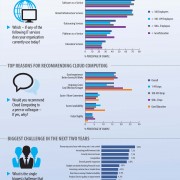The Cloud and the Fourth Amendment: What You Should Know
A judge’s ruling last week that a user’s data is not protected by the Fourth Amendment concerns some businesses who use cloud hosting services. The ruling essentially states that consumers and organizations aren’t protected by the amendment that requires a warrant to be in place before a search and seizure can be conducted.
Cloud-Hosted Data
The ruling is primarily an effort to protect American servers against terrorism. Yet, for businesses concerned about the safety of company secrets, the fact that officials could sift through those secrets brings with it many reasonable questions. Who are these entities? How can a business be sure only authorized officials have access to any retrieved information?
Interestingly, at the same time, a Washington, D.C. judge ruled that the NSA phone surveillance program was very likely in violation of the Fourth Amendment, making it clear that this is a discussion that will continue for some time. Meanwhile, businesses are wondering if they’re likely to be impacted by one of these searches.
Borrowing Trouble
For the vast majority of businesses, there is little likelihood that government officials will ever take an interest in sifting through their data. Most cloud service providers will never be confronted with one of these searches, making cloud storage much safer than taking the risk of a hacker infiltrating on-site data that isn’t properly secured.
While lawmakers iron out the details, businesses can protect themselves by staying aboveboard with activities. Government officials aren’t likely to issue a subpoena to search data unless there’s a reason. A business that is operating honestly and legally isn’t likely to encounter an issue related to search and seizure, just as an honest, forthright citizen is unlikely to get a visit from the police at 8:00 on a Friday night.
The Fourth Amendment exists to protect consumers from unreasonable searches and seizures. Since officials generally conduct seizures because there is a reason, most businesses will never be impacted by a search and seizure of their cloud-hosted data. However, it’s important to note that whether a business is storing data in the cloud or not, officials can still obtain a subpoena and demand access to data if a reason exists to do so.


